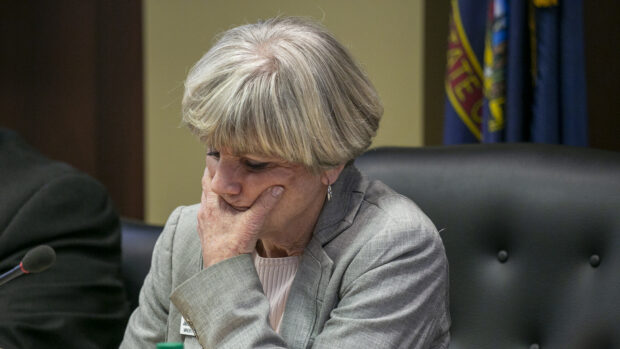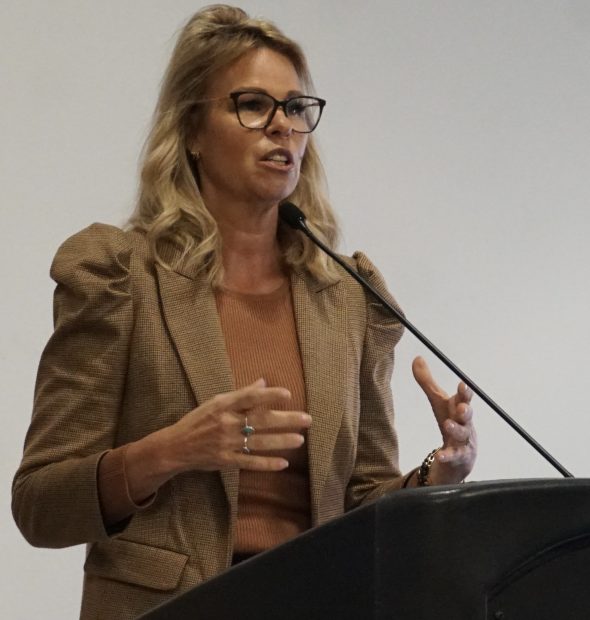Joshua Whitworth says his career has been “kind of a ping pong ball,” and he has the resume to back it up.
- Managing a Central Idaho ranch that has been in his family for four generations.
- Working for his alma mater, Idaho State University, in student recruitment.
- Serving as executive director of the Idaho Republican Party.
- Working an eight-year stint in the state controller’s office — a time that overlapped with a turbulent transition to a cloud-based business system.

Whitworth made his latest career move on July 1, when he became executive director of the State Board of Education. The job is as far-reaching as it is visible. The executive director implements a host of policies from kindergarten through college, and is the board’s day-to-day point person at the Legislature. And the job itself has changed, under a 2024 state law; for the first time, the executive director is a gubernatorial appointee subject to Senate confirmation.
Whitworth isn’t afraid of the change in the governance structure — and he says the state shouldn’t be fearful of big changes in education.
“One of the biggest things I do believe about Idaho is we are still small enough where, you know, strong leaders in the right positions can make a huge difference,” Whitworth said in a recent Idaho Education News interview. (Click here to listen to the full interview in podcast form.)
Lessons along the way
Whitworth grew up on his family’s Elkhorn Ranch in Mackay, where nearby Mount Borah, Idaho’s highest peak, stands sentry over a population of 439.
Whitworth graduated high school with 18 classmates. There weren’t many secrets around the school, or around the town. For instance, sneaking past the local bartender was out of the question. “There was that, ‘I know your birthday, Josh, please go back.’”
Now 43, Whitworth says he has taken more substantive lessons from his hometown.
He says Mackay is like many small towns in Idaho — and much of Idaho is like Mackay. There isn’t a lot of money in the local economy. It’s a struggle to recruit new teachers and keep them in town.
And everyone knows everyone — a lesson that transcends Mackay and applies in Idaho’s political arena. In both settings, he says, relationships matter. “You’re going to see that person again. … You can’t just be mad at somebody and never talk to them again.”
Whitworth’s past jobs have informed his approach to his new job:
- After getting his bachelor’s degree at Idaho State University — where he played football and served in student government — Whitworth took a job with his alma mater in 2010, working on student recruitment across the Northwest. His takeaway: If Idaho wants to convince more high school graduates to continue their education, it’s going to take the kind of “customer-obsessed” mindset adopted by Amazon. “If we are always looking at the student and bring it back to everything that we do, I think that is what will make us successful as a board and successful as a system.”
- Whitworth left Idaho State in 2012, when he was hired as the Idaho Republican Party’s executive director. The 13-month run took Whitworth to every corner of the state, discussing the GOP’s platform with local party members. In addition to building a network of local contacts, Whitworth said he saw the value of one-on-one, grassroots discussions of complicated policy issues.
- Whitworth left the GOP in 2013 to work for Controller Brandon Woolf — a statewide elected official with the apolitical job of overseeing the state’s books. For Whitworth, who was also pursuing an MBA at Boise State University at the time, working at the controller’s office was an education in the state’s budget, and the complicated process and mechanisms that move dollars into programs and initiatives.
As Woolf’s chief deputy, Whitworth also ran point on the troubled 2023 rollout of Luma, a centralized business solutions system that will cost the state more than $100 million. In a November 2023 hearing, House Speaker Mike Moyle labeled Luma “a joke;” calling for an exit strategy, Moyle grilled Whitworth over the data entry and process errors that plagued the launch.
One problem with the Luma launch — and one lesson learned — was in the value of buy-in. Agency leaders embraced the move, Whitworth said, but the state needed to do a better job of engaging the rank-and-file workers who have to use the system.
But Whitworth remains sold on Luma; he says the first-of-its-kind cloud-based system is the right move for Idaho.
“Change causes strife,” he said. “Too many times, leaders are afraid to enact the change because of the strife. But it doesn’t mean the change doesn’t need to happen.”
Change and controversy
Change in education policy is no less complicated. It also requires buy-in from stakeholders across the spectrum — groups with views and priorities that are often in conflict.

Gov. Brad Little says he is banking on Whitworth to build coalitions. “(He) has a proven track record of working effectively across broad stakeholder groups,” Little said in announcing the appointment on June 18.
Whitworth is inheriting a host of education controversies that have divided stakeholder groups.
The ongoing debate over private school choice mechanisms has drawn fire from the education lobbyists — but several school choice opponents lost in the 2024 GOP primary. Little’s $72 million-a-year early literacy program could face new scrutiny, in the face of stagnant reading scores. Idaho Launch — Little’s $70 million-a-year postsecondary grant program — has the support of colleges and universities and business leaders, but has run into vehement opposition from conservatives and their hardline allies in the Legislature.
Whitworth says the State Board can act as a “broker” of data about Launch — and whether the program is helping young adults obtain career skills. And he says the Launch debate needs to focus on the problems the state hopes to solve — a shortage of skilled workers, and the chronic challenge of convincing high school graduates to continue their education. “Launch is just a mechanism for solving something.”
And some of education’s loudest critics reside within Whitworth’s political party.
In June, Idaho Republican delegates passed platform language that called for cutting off higher education funding.
As the product of two of Idaho’s universities, Whitworth is a firm believer in the importance of higher education. But as the higher education debate has centered on social justice and diversity issues, it has drowned out the discussion of the worth of a degree and the value of lifetime learning.
“We do have a challenge,” he said. “I think we haven’t done a good enough job to move the Republican faithful around (to) that value. I take that as a personal challenge.”
A new political reality
Whitworth succeeds Matt Freeman, who held the executive director’s post for nine years. But Whitworth will take the job under a new set of rules. A comprehensive new school facilities law also made the executive director a gubernatorial appointee, subject to Senate confirmation.
The confirmation process is often fairly quiet — even in the education arena. But not always. In 2023, the Senate rejected Idaho Public Charter School Commission appointee Karen Echeverria, saying the longtime Idaho School Boards Association chief would not be the advocate charter schools need.

Senate Education Committee member Janie Ward-Engelking has seen plenty of confirmation hearings in committee, some routine and sometimes heated. The Boise Democrat likes what she knows of Whitworth — and especially his work in the controller’s office to bring more transparency to local budgeting. But she said the specter of Senate confirmation will force Whitworth to walk a fine line on Launch, which has survived two years of close legislative votes.
The executive director’s job, she said, “is certainly more political now.”
Republican state superintendent Debbie Critchfield, a State Board member, is impressed by Whitworth’s work ethic — and his quick command of the intricate education policy issues he has inherited. If Whitworth is thinking about the Senate confirmation process that awaits in 2025, she said he hasn’t let on.

“My first impressions are that he’s there to do the right things and to do the job,” Critchfield said Wednesday. “There’s such an incredible amount of work. I don’t know that Josh has had time to probably weigh personally, ‘Gosh, what does this mean to me?’”
The new governing framework “doesn’t feel that different,” Whitworth said. The job still requires working with a governor who is passionate about education, a gubernatorial-appointed board with strong views and legislators with strong opinions of their own. Whitworth says it’s his job to find alignment and agreement.
“If we’re going to do things as a state, it can’t just be the board,” he said. “It can’t just be the Legislature, can’t just be the governor.”
